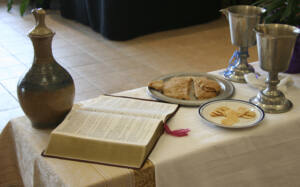
WelCom June/July 2024
James B Lyons, Priest of Wellington
The expression, two’s company, three’s a crowd, tells us a third person can be intrusive, a misfit. It can signal a selfish attitude: we just want to keep to ourselves; we don’t want to have to share.
We also hear, bad things happen in threes – I burnt the toast this morning and I forgot to put the rubbish out. What’ll be the third thing?
On the positive side, we see three as the optimum number to describe our God: a Trinity: One God, Three Persons. And this month we meet another three-fold formula: Corpus Christi.
Corpus Christi is coupled with the feast of the Sacred Heart in June, honouring the Eucharist – the gift Jesus makes of himself in the bread and wine.
There’s a formula associated with this, coming from Jesus’ action at the Last Supper and repeated whenever he was involved in feeding the people: Jesus takes the bread, breaks the bread and gives it to the people.
This triple action of taking, breaking, giving is the key to our understanding not only of what the Mass is about but how our lives as Christians are to be lived.
John’s gospel account tell us that many are unable to accept Jesus’ words about the need to ‘eat my flesh and drink my blood’: How can this man give us his flesh to eat? they ask. This is not so much a question about cannibalism, but a difficulty in accepting that anyone could give the whole of themselves for the good of someone else.
What Jesus is showing is that when you give what you’ve got you will never be without; when you hold back and hoard you will never have enough! When Jesus says, Do this in memory of me, he doesn’t want us to simply repeat his action as a kind of memorial but to give ourselves as he did.
The triple action of taking, breaking, giving is the key to our understanding not only of what the Mass is about but how our lives as Christians are to be lived.
When you love as Jesus loves you will be taken, broken and given. But you’ll never be more whole. Corpus Christi, together with the Sacred Heart of Jesus, make the point even stronger.
What exactly is the ‘Body of Christ’? Is it just the consecrated bread and wine? And what is the implication of the ‘Amen’ we say as we receive?
As a title, the Body of Christ refers to the whole Church – the People of God – ordinary people living out their faith in the here and now of each day, as well as those who have died and are remembered at every Mass.
There is also the group of Saints, our models of Christian living. In our Creed we speak of the Communion of Saints – all of us together, past and present – the word Communion hinting at the significance of this Body.
A community is a union of people – never a person alone. Communion implies a togetherness, which in turn implies some sharing, some giving of one another, some energy from each to keep the community alive.
The Body of Christ (Corpus Christi) is the entire grouping of those who follow the way of Jesus. He is present in that Body, drawing us ever closer to his Sacred Heart. When I say AMEN to the Body of Christ, I give my agreement, and therefore my commitment, to the belief that I do not receive Jesus in isolation from all of God’s people.
When I receive the Body of Christ, I receive you and you and you…. In being drawn into the life of Jesus, I am drawn into your life as well. We are one in the Body of Christ.
Jesus indicated this when he placed the Eucharist in the context of the washing of his disciples’ feet. Only in so far as we are humble, hospitable and caring of one another, does the life of Jesus embrace us.
The three-time formula: Jesus took the bread, broke it and gave it, happens in an action of thanksgiving. We give thanks for what we know we have neither created nor achieved on our own. Three is no longer a crowd or an omen for bad things.
Your AMEN to your communion can become both an act of faith and a readiness to be taken, broken and shared.